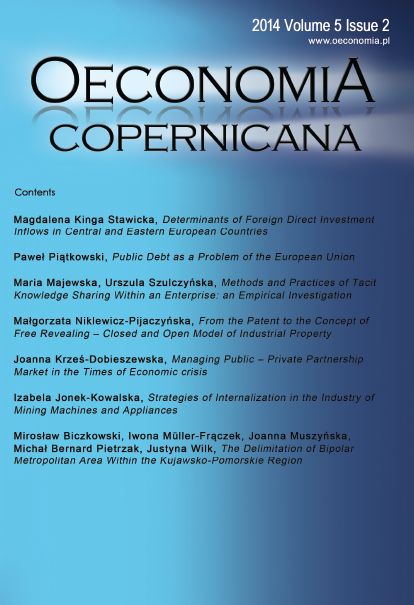Determinants of Foreign Direct Investment Inflows in Central and Eastern European Countries
DOI:
https://doi.org/10.12775/OeC.2014.010Keywords
FDI, Central and Eastern Europe, EU, determinantsAbstract
In the paper the author tries to analyse the value of foreign direct investments inflow into certain Central and Eastern Europe countries and to assess determinants which cause these countries to attract large value of the foreign direct investments. Twenty countries of the aforementioned region were analysed. Ten of them belong to the European Union including three belonging to the Eurozone. Additionally, the paper contains presentation of the most significant determinants of the foreign direct investments based on investors’ motives. In order to achieve the aforementioned goal, the author reviewed the literature on the subject paying special attention to the issues in question, and she presented the results of the survey focused on the FDI determinants in the economies which are the subject of this paper. The paper also contains results of two surveys conducted by the author in 2006 and 2012 regarding motives of the entrepreneurs who make foreign direct investments in the territory of the EU countries. Review of the theory, analysis of general empirical observations and own surveys of the author prove that the size of a market, the possibility to maximize profits and discounts and privileges for investors are the most substantial internal and external factors which encourage entrepreneurs to invest on foreign markets. Moreover, membership in the European Union and/or the Eurozone, as well as the warranty of macroeconomic stability of a country also pose a substantial advantage when an investor chooses the location for an investment.References
Bamber B., Kiciński W. (1990), Joint ventures w krajach Europy Środkowej i Wschodniej, Handel Zagraniczny, nr 10.
Beyfuß J. (1996), Erfahrungen deutscher Auslandsinvestoren in Reformländern Mittel – und Osteuropas, Köln.
Budner W. (2004), Lokalizacja przedsiębiorstw. Aspekty ekonomicznoprzestrzenne i środowiskowe, Wydawnictwo Akademii Ekonomicznej w Poznaniu, Poznań.
Campos N.F., Kinoshita Y. (2003), Why does FDI go where it goes? New evidence from the transition economies, IMF Working Paper, IMF Institute.
Carstensen K., Toubal F. (2004), Foreign Direct Investment in Central and Eastern European Countries: A Dynamic Panel Analysis, “Journal of Comparative Economics”, Vol. 32, No. 1, http://dx.doi.org/10.1016/j.jce.2003.11.001.
Disdier A., Mayer T. (2004), How Different Is Eastern Europe? Structure and Determinants of Location Choices by French Firms in Eastern and Western Europe, “Journal of Comparative Economics”, Vol. 32, No. 2, http://dx.doi.org/10.1016/S0147-5967(04)00019-8.
Dziemianowicz W. (1997), Kapitał zagraniczny a rozwój regionalny i lokalny w Polsce, „Studia Regionalne i Lokalne”, Vol. 21, No. 54.
Garibaldi P., Mora N., Sahay R., Zettelmeyer J. (2001), What moves capital to transition Economies, IMF Staff Papers, vol. 48, Special Issue.
Holland D., Sass M., Benacek V., Gronicki M. (2000). The determinants and impact of FDI in Central and Eastern Europe: A comparison of survey and econometric evidence, “Transnational Corporations”, Vol. 9.
Kuciński K. (2009.), Geografia ekonomiczna, Oficyna Wolters Kluwer Business, Kraków.
Markusen J. (1995), The Boundaries of Multinational Enterprises and the Theory International Trade, “Journal of Economic Perspectives”, Vol. 9, http://dx.doi.org/10.1257/jep.9.2.169.
Nunnenkamp P., Spatz J. (2002), Determinants of FDI in developing countries: has globalization changed the rules of the game?, “Transnational Corporations”, Vol. 11.
Oziewicz E (1998), Zagraniczne inwestycje bezpośrednie w rozwoju gospodarczym Azji Południowo-Wschodniej (ASEAN), Wydawnictwo Uniwersytetu Gdańskiego, Gdańsk.
Przybylska K. (2001), Determinanty bezpośrednich inwestycji zagranicznych w teorii ekonomii. Wydawnictwo Akademii Ekonomicznej w Krakowie, Zeszyt Naukowy Nr 144, Kraków.
Rymarczyk J. (1996), Internacjonalizacja przedsiębiorstwa, Polskie Wydawnictwo Ekonomiczne, Warszawa.
Szromik A. (1993). Rynki Europy Wschodniej w oczach niemieckich przedsiębiorstw, Fundacja im. Friedricha Eberta, Warszawa.
Witkowska J. (1997), Bezpośrednie inwestycje zagraniczne w Europie Środkowo-Wschodniej, Wydawnictwo Uniwersytetu Gdańskiego, Gdańsk.
World Investment Report 2012. Towards a New Generation of Investment Polices (2012), United Nations Conference on Trade and Development, New York and Geneva.
Downloads
Published
How to Cite
Issue
Section
Stats
Number of views and downloads: 467
Number of citations: 0



